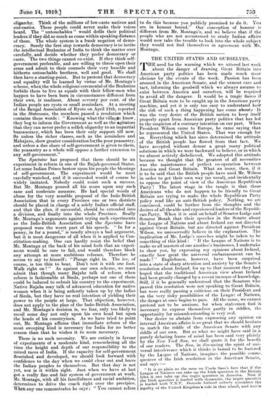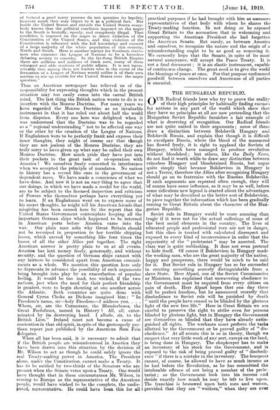THE UNITED STATES AND OURSELVES.
THE need for the warning which we uttered last week about the danger of drawing Great Britain into American party politics has been made much more obvious by the events of the week. Passion has been aroused in the American Senate, and the utmost care and tact, informing the goodwill which we always assume to exist between America and ourselves, will be required to avoid all the dangers: It would be a tragic fiasco if Great Britain were to be caught.up in the American party machine, and yet it is only too easy to understand how the risk of such a thing happening has come about.' It was the very desire of the British nation to keep itself properly apart front American party politics that has led to the suspicion of a contrary intention on our part. When President Wilson came to Europe, he came saying that he represented the United States. That was enough for us. Everything which has since determined the attitude of the British people has flowed from that fact. We have accepted without demur a great many political solutions in which we were backward to believe, or in which we almost actively disbelieved. We adopted this attitude because we thought that the greatest of all necessities was the maintenance of perfect co-operation between America and Great Britain. What an irony, then, if it is to be said that the British people have used Mr. Wilson in order to get their own way (as usual), and incidentally to oppose the point of view of the American Republican Party ! The latest stage in the tangle is that those Americans who do not happen to be friendly to Great Britain are trying to make the whole Republican Party policy read like an anti-British policy. Nothing, we arc convinced, could be further from the thoughts and the desires of all the able and experienced leaders of the Republi- can Party. When it is said on behalf of Senator Lodge and Senator Borah that their speeches in the Senate about the League of Nations and about Ireland are not directed against Great Britain. but are directed against President Wilson, we unreservedly believe in the explanation. The implication of Mr. Lodge's speeches might be taken to be something of this kind : "If the League of Nations is to make us all master; of one another's businesses, I undertake to show you, by expressing my opinions about Ireland, exactly how great the universal embarrassment can be made ! " Englishmen, however, have been surprised into a state of sharp attention and anxiety by the Senate's resolution about Ireland, for up to that moment they had hoped that the traditional American view about Ireland had been greatly changed by a recent increase of knowledge. Still, if it be generally understood that the Senators who passed this resolution were not speaking to Great Britain, but were really passing a criticism on their President and on the very risky possibilities of the Leagwi of Nations, the danger at once begins to pass. All the same, we cannot pretend not to be anxious, for when statesmen find it necessary to express themselves partly in riddles, the opportunity for misunderstanding is very real. Our desire to abstain front expressing any opinion ou internal American affairs is so great that we should hesitate to match the riddle of the ,American Senate with any riddle of our own. But as what we might have said in a purely debating frame of mind has been said very plainly by the New York Sun, we shall quote it for the benefit of our readers. The Sun, in discussing the spirit of .uni- venal interference which it thinks is bound to be fostered by the Leigue of Nations, imagines the possible conse- quences of the Irish resolution in the American Senate, and says "It is as plain as the nose on Uncle Sam's taco that if the League of Nations can take up the Irish question in the *Wall. Isles it.can take up the negro question in America. Now if the Irish question is loaded with dynamite, the negici question is loaded unit Outside Ireland nobody questiingi the legality of the United Kingdom's rule in that island, and inside of Ireland a good many persons do not question its legality, however much they may object to it as a political fact. But inside the United States and outside the United States every- body knows that the political condition imposed on the negro in the South is brutally, openly, and completely illegal. That condition is imposed on the negro in direct violation of the Constitution of the United States, and this violation of the Constitution is tolerated with the full knowledge and consent of a large majority of the white population of this country, North and South. Hem is another matter for Southern states- men who conceive the League of Nations to be a harmless debating society to consider. In the far-flung British Empire there are millions and millions of black men, many of them educated and able students of public affairs. It is not incon- ceivable that among them are leaders who in the event of the formation of a League of Nations would utilize it of their own motion to stir up trouble for the United States over the negro question."
Thus an American newspaper has relieved us of the responsibility for expressing thoughts which in the present situation may too easily come into the carnal British mind. The last thing the British nation wants to do is to interfere with the Monroe Doctrine. For many years we have regarded the Monroe Doctrine as an invaluable instrument in that it has ruled out about half the world from disputes. Every one here was delighted when it was understood that the Doctrine was to be regarded as a "regional understanding" not to be affected one way or the other by the creation of the League of Nations. If Englishmen were to be perfectly frank and express their inner thoughts, they might of course say that though they are not jealous of the Monroe Doctrine, they are truly sorry to have given up what may be called their own Monroe Doctrine. How much pride they have put into their pockets in the great task of co-operation with America ! We ourselves freely consented to interference when we accepted the principle of mandates. No nation in history has a record like ours in the government of dependent races. We have made a conscience of what we have done. And now it is not an easy thing to agree that our doings, in which we have made a model for the world, are to be subject to the licensed inspection and criticism of Powers who themselves perhaps have everything yet to learn. If an Englishman went on to express more of his secret thoughts, he might tell his American friends that misgiving has been caused here by the report that the United States Government contemplate keeping all the important German ships which happened to be interned in American ports before America came into the war. . Our plain man asks why Great Britain should not be recouped in proportion to her terrible shipping losses, which exceed by something like four times the losses of all the other Allies put together. The right American answer is pretty plain to us at all events. America has lent money freely, generously, and without security, and the question of German ships cannot with any fairness be considered apart from American commit- ments as a whole. We mention this question here only to deprecate in advance the possibility of such arguments being brought into play by an exacerbation of popular feeling. It would be too mad, too wicked, if the two nations, just when the need for their perfect friendship Is greatest, were to begin shouting at one another across the Atlantic. Both countries are quite done with General Cyrus Choke as Dickens imagined him : "In Freedom's name, sir—holy Freedom—I address you. . . . Where, sir, are the Cormorans, the Blunderbores, the Great Feefofums, named in History ? All, all, exter- minated by its destroying hand. I allude, sir, to the British Lion." Ireland must not become a cause of contention in that old spirit, in spite of the grotesquely par- tisan report just published by the American Sinn Fein delegates.
When all has been said, it is necessary to admit that if the British people are misunderstood in America they have been drawn into this situation by the decision of Mr. Wilson to act as though he could safely ignore the real Treaty-making power in America. The President alone, under the Constitution, cannot make a Treaty. It has to be ratified by two-thirds of the Senators who are present when the Senate votes upon a Treaty. One would have thought that in these circumstances Mr. Wilson, in coming to Europe as the representative of the American people, would have wished to be the complete, the undis- puted, representative. He could have been this for all practical purposes if he had brought with him as assessors representatives of that body with whom he shares the Treaty-making function. In not doing so he exposed Great Britain to the accusation that in welcoming and supporting the American President she had forgotten the American Senate. But surely, as between America and ourselves, to recognize the nature and the origin of a misunderstanding ought to be as good as removing it. We earnestly hope that the Senate, in spite of its most natural annoyance, will accept the Peace Treaty. It is not a final document ; it is an elastic instrument, capable of continuous change. The great need is to give the world the blessings of peace at once. For that purpose undimmed goodwill between ourselves and Americans of all parties is essential.



































 Previous page
Previous page